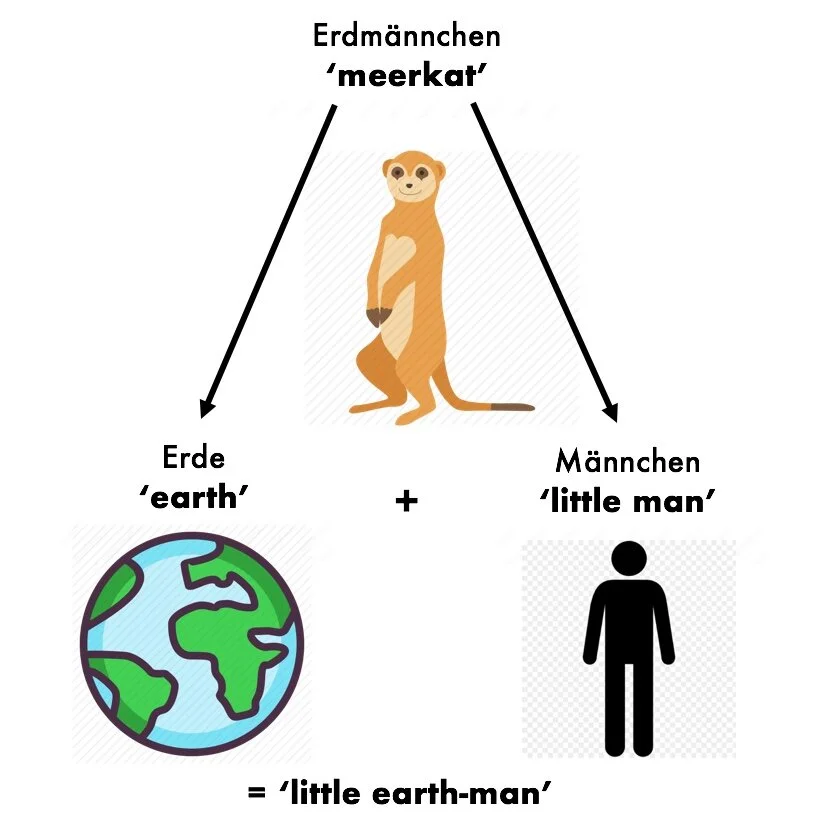Homebrew Etymology: Latin in English, Part 1
INTRODUCTION
If you are a learner of English trying to find your way through the maze of English word families (for example the family of “family,” which includes “familial,” “(un)familiar,” “familiarity,” “paterfamilias”), this post is for you!
If, on the other hand, you are already a speaker of English, but are curious about where words come from, how they’re put together and what they’re made of, this post is also for you!
If you’re learning Spanish, Italian, French, or any other Romance language, and are intrigued about similarities among the words of these languages, and those among Romance and English, this post is most assuredly for you!
Finally, if you’re new to linguistic concepts and the analysis of speech, this post should have something to offer you as well. The idea of a “homebrew guide to English word origins” is due to the linguist Haj Ross, who taught many of us who work at LanGo. Table 1 lays out the word classes we’ll see in this post with a few examples, and the functions of the Latin suffixes underlying them.
Table 1: Overview of 24 common Latinate suffixes and endings reflected in Modern English, alphabetized by keyword. The accent marks show the location of English primary stress, e.g. the notation [-átion] shows that stress falls on the A, while [ˈ-tion] shows that it falls on the syllable before the T.
A note on terms: a compound word is one made up of two (or more) components which are themselves words; here is a recent LanGoBlog post on compound words in Chinese, Japanese, and Korean, for a cross-linguistic perspective on this rich and fascinating topic. In this post I add a hyphen to Latin compounds to mark where one component meets the other, wherever convenient. This hyphen is not part of Latin spelling.
I use the term ending here to mean something slightly different from suffix: a suffix is a well-defined form associated with specific meanings and functions in a particular language, while I use “ending” merely to identify cases where a certain string of sounds or letters recurs. True English suffixes include [-ing], [-able], [-(e)s], which have stable, easily identifiable meanings and can be added to new bases to derive never-before-seen words that can readily be understood. English has taken in many Latin words, with many ending in the same strings of letters, but that does not imply that these common elements are meaningful parts within English. For example, we have “suture” and “nature” ending in URE or TURE; but are these meaningful word-forming elements within English?
With that out of the way, let’s dig in to today’s word classes.
“AREA” CLASS
I chose the word “area” to cover two suffixes: adjective-forming [-ar], and the noun/adjective ending [-a]. Aside from “familiar” mentioned in Table 1 (from Lat. familia ‘family, household’) we find [-ar] endings in English words such as “exemplar” (from Lat. exemplum ‘copy, sample’) and “molar” (from Lat. molaris ‘millstone’). Note that its pronunciation varies between [ɑɚ], under minor stress, and unstressed [ɚ].
The ending [-a] that we find in English words from Latin has two primary grammatical values: feminine singular in words like
“alumna” (plural “alumnae”; compare masculine “alumnus/alumni,” all from the verb alere ‘foster, nourish’)
“via” meaning ‘by way of’ (from the Latin for ‘way’)
and neuter plural in words like
“agenda” (Lat. ‘[things] to be done,’ from the verb agere) and
“stamina” (plural of stamen ‘thread, warp’).
In English the endings spelled [-a] are always unstressed: [ə].
“CITY” CLASS
The word City covers two variants of a single abstract-noun-forming suffix: the longer [-ity] as in
“civility” (from Lat. civilis ‘civil, public’)
“fidelity” (from Lat. fidelis ‘faithful,’ from fides, the source of our word “faith”)
and the shorter [-ty] in words like “frailty” and “fealty” (the latter from the same source as “fidelity”). The shorter form is usually encountered in words English took from French, the daughter language of Latin whose home is closest to England.
Other common words with [-ity] include
“diversity” (from the Lat. compound di-versus/~a/~um ‘opposite, different’)
“gratuity” (from Lat. gratuitus/~a/~um ‘freely given’ based on gratus/~a/~um ‘pleasing, agreeable’)
“humility” (from Lat. humilis ‘lowly, humble’ based on humus ‘ground, soil’)
“luminosity” (from Lat. lumen ‘light’)
“magnanimity” (a compound from Lat. magnus animus ‘great soul’--compare the name Mahātma, which is a Sanskrit compound with the same meaning: mahā ‘great’ + ātman ‘soul’)
“DANCE” CLASS
This class embraces three suffixes that form abstract nouns: [-ance], [-nce], [-ce]. “Abstract,” meaning things ‘that cannot be touched,’ contrasts with “concrete:” ‘things that can be touched or perceived by the senses.’ The word “dance” itself does not actually contain any of the endings we’ll see in this section, it’s just a convenient heading. Welcome to my dance class!
The longest form of this important suffix, [-ance] appears in hundreds of words, including
“abundance” (from the Lat. compound ab-undare ‘flow down, overflow,’ made of ab ‘off, away’ and unda ‘wave’; the verb “abound” is connected)
“ˈentrance,” noun with initial stress (from the Lat. compound in-trare ‘go into’ via French; the verb “enˈtrance” and its component “trance” are related to “transit,” from Lat. trans-ire ‘go across’)
“malfeasance” (from Fr. malfaire, from the Lat. compound male-facere ‘do evil’)
“tolerance” (from Lat. tolerare ‘bear, put up with’)
“Forbearance” and “comeuppance” are red herrings: their roots are Old English, from the Germanic stock of words. This is the reason there are no adjectival forms *forbearant or *comeuppant, which we might otherwise expect (see the “Mental” class below). Beware such impostors, as they will not have closely related words (cognates) in French, Spanish, or other Romance languages.
The other vowel commonly found before the ending [-nce] from Latin roots is E:
“ambivalence” (a compound from Lat. ambo ‘both’ and valentia ‘strength’)
“coincidence” (from Lat. co-, combining form of cum ‘along with’ and the compound verb in-cidere ‘fall into,’ with a combining form of cadere ‘fall’)
“malevolence” (a compound from Lat. male volens ‘wishing bad’)
The words “pence,” “twopence” do not belong here: they reflect the exceptional plural of “penny” (from a Germanic word), while “dunce” is from the name of the medieval philosopher Duns Scotus. Other red herrings are “once” (adverbial derivative of “one”) and the family “hence/thence/whence,” all from Germanic.
There are Latinate words ending in <-ince>, but they do not contain this abstract-noun ending:
“convince” and “province” are built on the present stem of vincere, vici ‘conquer’
“prince” is from the Lat. agent compound princeps, meaning ‘one who takes first,’ root verb capere
Finally, there is a large class of nouns from Latin ending in [-ce], only some of which are abstract nouns:
“grace” (from Lat. gratia, based on gratus/~a/~um ‘pleasing, agreeable,’ compare “grateful” and “gratuity,” mentioned above)
“sauce” (from Vulgar Latin *salsa, based on Lat. sal ‘salt’)
“space” (from Lat. spatium ‘extent, distance,’ note the spelling of the adjective form “spatial”)
“spice” (from Lat. species ‘kind, sort,’ which has since been re-borrowed into English)
Some endings related to these are [-ncy] as in “complacency” (doublet of “complacence”) and the [-ntsia] in “intelligentsia”: this one comes, ultimately from the Latin abstract noun, into English through Russian or Polish, and therefore many pronounce the G as [g] rather than [dʒ].
“DATE” CLASS
This heading includes three frequent and important endings. The longer string of letters, [-ate] can be [1] stressed, with the pronunciation [ejt], or [2] unstressed, [ət]. Ending [3] is [-te] occurring after vowels other than A. The word “date” itself comes from a participle datus/~a/~um meaning ‘given,’ from the verb dare ‘give.’ English “data” (from the neuter plural) comes from the same source: see the “Area” class above.
The stressed ending [1] occurs in adjectives and verbs:
“dominate” v. (from Lat. dominus ‘lord, owner of a residence,’ based on domus ‘house, abode’)
“fascinate” v. (from Lat. fascinum ‘type of amulet; witchcraft’)
“incarnate” adj. (a compound from Lat. in ‘in(to)’ and the stem of caro ‘flesh’)
“neonate” adj. (from the Lat. compound neo-natus/~a/~um ‘newborn,’ with participle natus/~a/~um from the verb (g)nasci ‘be born’)
“pontificate” v. (from the Lat. compound ponti-fex ‘high priest,’ originally meaning ‘bridge-maker’)
Verbs in this class have derivative nouns in the “Nation” class (“fascination,” “pontification”), see below.
The unstressed form [2] occurs in adjectives and a few nouns:
“electorate” n. (from “elect,” from Lat. e-ligere, compound verb meaning ‘pick out,’ from e-/ex ‘out’ and legere ‘pick’)
“passionate” adj. (from Lat. passio ‘suffering, enduring,’ based on the verb pati ‘suffer, endure’)
“subordinate” adj./n. (compound from Lat. sub ‘under’ and the stem of ordo ‘row, arrangement’)
“temperate” adj. (from Lat. tempus ‘time, due season’)
The related ending [-te], number [3], shows up in these English words of various categories, after vowels other than A:
“complete” v./adj. (from the Lat. compound verb com-plere ‘fill up’)
“finite” adj. (from Lat. finis ‘end, boundary’)
“remote” adj. (from the supine form remotum of the Lat. compound re-movere ‘take away,’ made of re-/red- ‘back’ and the verb movere ‘move’); or as an English noun, short for “remote control”
“resolute” adj. (from the Lat. compound resolvere ‘release,’ with re-/red- ‘back’ and the verb solvere ‘loosen, relax,’ which is itself a compound of se- ‘away’ and luere ‘wash, cleanse’)
We find a related ending in the word “literati,” meaning ‘lettered (people),’ based on the noun lit(t)era ‘letter’ with the Latin ending [-i] marking nominative plural masculine.
“HORRID” CLASS
I chose the label “Horrid” for this wonderful class because the word “horrid,” ending in [-id], is itself a member of the class, and because the string of letters H-O-R-R-I-D contains the two suffixes in question: noun-forming [-or] and adjective-forming [-id]. English has a few isolated words, but one nice characteristic of this minor class of Latin borrowings is that we have several pairs, as shown in the table.
Table 2: English noun-adjective pairs from Latin suffixes [-or / -id].
Note that in cases like “humor” : “humid,” because of a shift in meaning, English speakers may no longer feel that there is any connection between the two words. In this case the primary sense was ‘wetness,’ still preserved in the Eng. adjective, whereas the noun “humor” developed its modern sense in connection to the medical doctrine of Humorism, which would eventually give way to germ theory. In the pair “rigor” : “rigid,” the differing sounds of the G may make it less likely that English speakers connect these forms with each other.
Isolates in this class include
“avid” (Latin lacked a corresponding noun)
“frigid” (Latin had a noun frigor ‘cold,’ which English has not borrowed)
“nitid” (Latin had a noun nitor ‘brightness’)
“terror” (Latin also lacked a corresponding adjective in [-id])
“trepid,” less frequent than its derivatives “intrepid” and “trepidation” (Latin lacked a corresponding noun in [-or])
“MENTAL” CLASS
This covers a few very large and important classes of words. It embraces the suffixes [-ment], [-men], participial [-ent], [-nt], and adjective-forming [-al]. Let’s examine the first two of these, which form nouns from verb roots, together:
“foramen,” meaning ‘opening’ (from Lat. forare ‘pierce, bore’)
“government” (through French from Lat. gubernare ‘guide, steer,’ a borrowing of the Greek verb ΚΥΒΕΡΝΑΩ kubernao, from which we also get “cyber”)
regimen” and “regiment” (from the Lat. verb regere ‘rule, govern’)
“testament” (from Lat. testari ‘attest, be a witness,’ based on the noun testis ‘witness’)
The next pair of endings, [-ent] and [-nt], show up after verb roots, mostly to derive present active participles, meaning that they functioned in Latin roughly like our modern [-ing] suffix in English.
“ascent” n. (from the Lat. compound a-scendere ‘climb up,’ consisting of ad ‘up to’ and scandere ‘climb’)
“participant” n. (from the Lat. compound particeps ‘sharing,’ made up of pars, partem ‘part’ and an agent derivative of capere ‘take’)
“quiescent” adj. (participle of the verb quiescere ‘rest, lie still’)
“silent” adj. (from Lat. silere ‘make no sound’)
Words like “advent,” “convent” seem to contain this ending, but the <en> here is part of the root (compounds ad-venire, con-venire built on venire, participle ventus, ‘to come’).
The Latin adjective-forming suffix [-al] is in origin the same as [-ar], for which see the “Area” class above. The variant [-al] was basic, but if the root it was added to contained an L, the variant [-ar] was selected (via dissimilation: avoidance of similar sounds in close proximity), hence “lunar,” “calendar,” “exemplar”; compare “plural” (R intervenes after L) with “singular.”
“decimal” (from Lat. decem ‘ten’)
“equal” (from Lat. aequus ‘level, flat, fair’)
“formal” (from Lat. forma ‘shape’)
“real” (from Lat. res ‘thing, stuff, story’)
“sensational” (ultimately from Lat. sentire ‘feel’)
“NATION” CLASS
This set of endings reflects a huge class of noun derivatives from verb roots. We’ll start with the longest form of this ending, [-átion], where the stress is always on the A.
“consideration” (from the Lat. compound con-siderare ‘examine, investigate,’ made up of con-, combining form of cum ‘along with,’ and sidus ‘star, constellation,’ from Greek)
“federation” (from Lat. foederare ‘ratify a treaty,’ from the noun foedus ‘pact, treaty’)
“station” (from Lat. stare ‘to stand’)
We also find a shorter form [-tion] (always unstressed [ʃn̩]) with vowels other than A, as well as consonants preceding:
“assumption” (from the Lat. compound as-sumere ‘take up, adopt,’ based on ad ‘toward,’ and the verb su-mere ‘seize, claim,’ which is itself a compound of sub ‘under’ and emere ‘buy, take’; the [p] arises as a transitional sound between [m] and [t])
“depletion” (from the Lat. compound de-plere ‘empty out,’ made up of de ‘away from’ and plere ‘fill’)
“fraction” (from Lat. frangere ‘break,’ cognate with our English word)
“ignition” (from Lat. ignis ‘fire’)
“lotion” (from a combining form of the Lat. verb lavare ‘wash,’ also the source of “lavatory” and “laundry,” Spanish lavanderia)
“reaction” (from the Late and Medieval Latin compound re-agere ‘do again,’ made up of re-/red- ‘back, again’ and agere ‘do, act’)
“solution” (from the Lat. compound solvere ‘loosen, relax,’ mentioned above in the “Date” class)
A still shorter form [-ion] occurs primarily after S; nouns like “medallion” and “stallion” do not seem to be of Latin origin, while “million” is. The single S occurring before the ending [-ion] in the following words is most often the result of a Latin sound change: when a stem ending in D or T (dental stops) came in contact with a suffix starting with T, S regularly replaces both consonants.
“cohesion” (this one is special, the root ended in R from an older [z] from [s]: Lat. compound co-haerere ‘cling, stick together,’ made up of co-, combining form of cum ‘together,’ and haerere ‘cling, stick’)
“conversion” (from the Lat. compound con-vertere ‘rotate, turn upside-down,’ which also has con-, variant of cum, and vertere ‘turn’: root ends in T)
“derision” (from the Lat. compound de-ridere ‘mock, make fun of’ made up of de ‘of, from’ and ridere ‘laugh’: root ends in D)
“fashion” (through French, from Latin factionem ‘doing, making, group of people acting together,’ also the source of “faction,” from the verb facere ‘do, make’)
“illusion” (from the Lat. compound illudere or in-ludere ‘mock, ridicule,’ made up of in and ludere ‘play, mock, trick’: root ends in D)
“vision” (from Lat. videre ‘see,’ also the source of “video”: root ends in D)
Greek words like “ion,” “perihelion,” “criterion” do not belong here; note that their stress pattern differs, and the string -ION is always pronounced as two syllables.
Finally, an even shorter form [-on] is found in a few Latin words that come into English through French, where several sound changes took place. The French S in these words is an outcome of the Latin sequence TI before a vowel.
“reason” (from the same source as “ration” and “ratio,” Lat. ratio (nominative), rationem (accusative) ‘motive, calculation,’ from the verb reri ‘judge, calculate’)
“season” (from Lat. sationem ‘sowing, planting,’ from the verb serere ‘sow, plant’)
“treason” (from Old Fr. traïson, from Lat. traditionem ‘delivery, surrender,’ also the source of Eng. “tradition,” all from the compound verb tra-dere ‘deliver, transmit,’ made up of combining forms of trans ‘across’ and dare ‘give’)
In all words in this “Nation” class the primary stress falls on the syllable before the [-(i)on] ending.
“SITE” CLASS
This class covers two strings of letters, [-it] and [-ite], the latter of which has two pronunciations: (strongly or weakly) stressed [ajt], and unstressed [ɪt] or [ət]. The word “site” itself comes from Lat. situs/~a/~um ‘placed, set,’ participle of sinere ‘set down.’ Words in this class are mostly participles (compare the “Date” class above), and a few are verbs.
“ignite” (from Lat. ignis ‘fire’)
“implicit” (from Lat. implicitus/~a/~um ‘involved, entangled,’ from the verb im-plicare ‘embrace,’ also the source of “imply”; this verb is a compound of in ‘into’ and plicare ‘fold, bend’)
“infinite” (from the Lat. compound infinitus/~a/~um ‘boundless, immense,’ from negative in- and the noun finis ‘end’: the sense is ‘having no end’). Note that the English pronunciation is [ˈɪnfɪnɪt] while the non-negative adjective “finite” (‘having a limit’) is [ˈfajnajt]!
“opposite” (from Lat. oppositus/~a/~um ‘against,’ from the compound verb op-ponere ‘set against,’ made up of ob(s) ‘toward, against’ and ponere ‘put,’ which itself is a pre-Latin compound related to sinere ‘put, lay down’)
“requisite” (from Lat. requisitus/~a/~um ‘needed,’ from the compound verb re-quirere ‘seek, need,’ made up of re-/red- ‘back, again’ and quaerere ‘seek, ask’)
“respite” n. (from French, at its root the same word as Lat. respectus/~a/~um, which English has re-borrowed directly from Latin as “respect.” This participle respectus is from the compound verb re-spicere ‘look back at,’ with re-/red- ‘back’ and the verb specere ‘observe, look at’)
“tacit” (from Lat. tacitus/~a/~um ‘unspeaking; not spoken of,’ from the verb tacere ‘be silent, be still.’ “Reticent” is also from this root.)
“trite” (from Lat. tritus/~a/~um ‘rubbed, worn out,’ participle of the verb terere ‘rub, wear away’)
“SURE” CLASS
The last class we’ll consider in this post consists of words ending in URE. Most of these are abstract nouns, while “future” reflects a future active participle.
“erasure” (from the Lat. compound e-radere ‘scrape away, delete,’ made up of e-, combining form of ex ‘out,’ and radere ‘scrape, scratch,’ also the source of “razor”)
“future” (future participle of esse ‘be,’ from the Indo-European root *bhū ‘be, grow, become’)
“rupture” (from Lat. ruptura ‘breaking,’ from the verb rumpere ‘break, burst,’ also the root of “corrupt”)
“secure” and “sure” (both from the Lat. compound se-curus/~a/~um ‘carefree,’ with the component se- we saw above in solvere. The shorter English word “sure” comes through French, where stop consonants between vowels like [k] were often lost.)
“suture” (from Lat. suere ‘sew,’ cognate with our English verb and with Sanskrit sū́tra ‘thread; rule’)
CONCLUSION
I hope you’ve enjoyed this survey of English words from Latin, and have spotted a few of the many interconnections to be found among disparate words. To wrap up this post let me set out a way to use these word classes as a diagnostic tool: If a word in one class has related words in other classes, it’s almost certainly a word from Latin, and therefore likely to have descendants in the daughter languages, as well as other English derivatives.
For instance, consider the word “nature,” ending in URE and a likely member of the “Sure” class. Is it from Latin? Subtract the ending [-ure] and we’re left with NAT; now try attaching other endings to this. “Nation” is a well-formed word, name of one of my word classes, and there’s also “native” and its derivative “nativity,” in the “City” class. We have a hit! These words all reflect the Lat. verb (g)nasci ‘be born,’ mentioned above.
Here’s a test case you may find interesting. Occasionally English has soundalike words, one of which is from the native word stock, and the other of Latin or Greek origin. We have one word “grave” meaning ‘heavy’ (as in “grave danger,” “grave illness”) and another meaning ‘place of burial.’ Which is from Latin?
Let’s look for other words in its family: we can add [-ity] (as in “City”) after removing the E to get “gravity” (‘heaviness’) and we can add [-ure] to form “gravure,” name of a printing process. We can safely deduce that it is the adjective meaning ‘heavy’ that is from Latin.
We hope these classes are a useful tool on your word-watching adventures!


































Tools for helping you master some of the trickier points of German grammar, whether you’re learning it for the first time or wanting to review the fundamentals. Los geht’s!